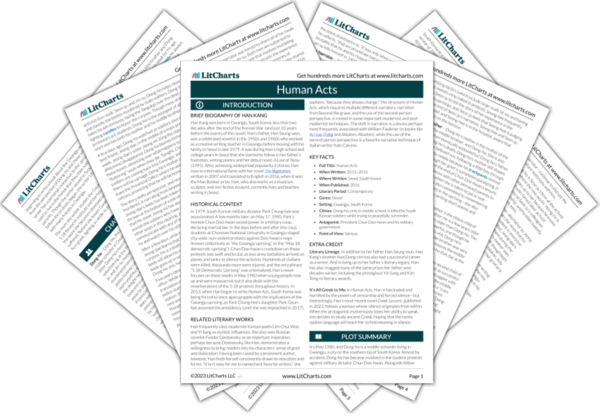In Human Acts, author Han Kang presents language as a powerful tool of protest and resistance—so it is perhaps a surprise that in the novel, pens and ink are almost always associated with violence. The unnamed narrator and Jin-su, both taken prisoner after the Gwangju uprising, suffer when armed guards use expensive Monami Biro pens for excruciating forms of torture. And for Eun-sook, who is working covertly to publish dissident plays, looking at the pages the state censor’s ink-roller has erased feels like being “burned.” On the one hand, then, pens and ink symbolize Chun Doo-hwan’s dictatorial efforts to silence any disagreement: he blots out protest art, rips up activists’ fliers and posters, and tortures those who speak against him until they feel “utterly devoid of anything that could be said to resemble humanity.”
But on the other hand, Chun Doo-hwan’s commitment to destroying language also reflects the power words have to create real change. Even though the actors in the play Eun-sook works on are only allowed to mouth their lines, the shapes of the words are still enough to energize an entire audience. Dong-ho’s mother, mourning her son, redraws every set of posters that Chun doo-hwan’s soldiers shred, eventually helping to unseat the dictator. And Han Kang, by concluding her novel with a focus on the writer, a fictional stand-in for Han herself, emphasizes that language continues to bring justice to the victims of state violence. After all, readers of Human Acts are encountering this story through words, thus helping to remember a historical reality that Chun Doo-hwan is now powerless to erase.
Pens and Ink Quotes in Human Acts
Her initial impression is that the pages have been burned. They’ve been thrown onto a fire and left to blacken […]
More than half of the sentences in the ten-page introduction have been scored through. In the thirty or so pages following, this percentage rises so that the vast majority of sentences have aligned through them. From around the fifth page onward, perhaps because drawing a line had become too labor-intensive, entire pages have been blacked out, presumably using an ink roller […]
She recalls sentences roughly darned and patched, places where the forms of words can just about be made out in paragraphs that had been otherwise expunged. You. I. That. Perhaps. Precisely. Everything. You. Why. Gaze. Your eyes. Near and far. That. Vividly. Now. A little more. Vaguely. Why did you. Remember? Gasping for breath in these interstices, tiny islands among language charred out of existence.

Unlock explanations and citation info for this and every other Human Acts quote.
Plus so much more...
Get LitCharts A+At that moment, I realized what all this was for. The words that this torture and starvation were intended to elicit. We will make you realize how ridiculous it was, the lot of you waving the national flag and singing the national anthem. We will prove to you that you are nothing but filthy, stinking bodies. That you are no better than the carcasses of starving animals.
[…] Watery discharge and sticky puss, foul saliva, blood, tears and snot, piss and shit that soiled your pants. That was all that was left to me. No, that was what I myself had been reduced to. I was nothing but the sum of those parts. The lump of rotting meat from which they oozed was the only “me” there was.












